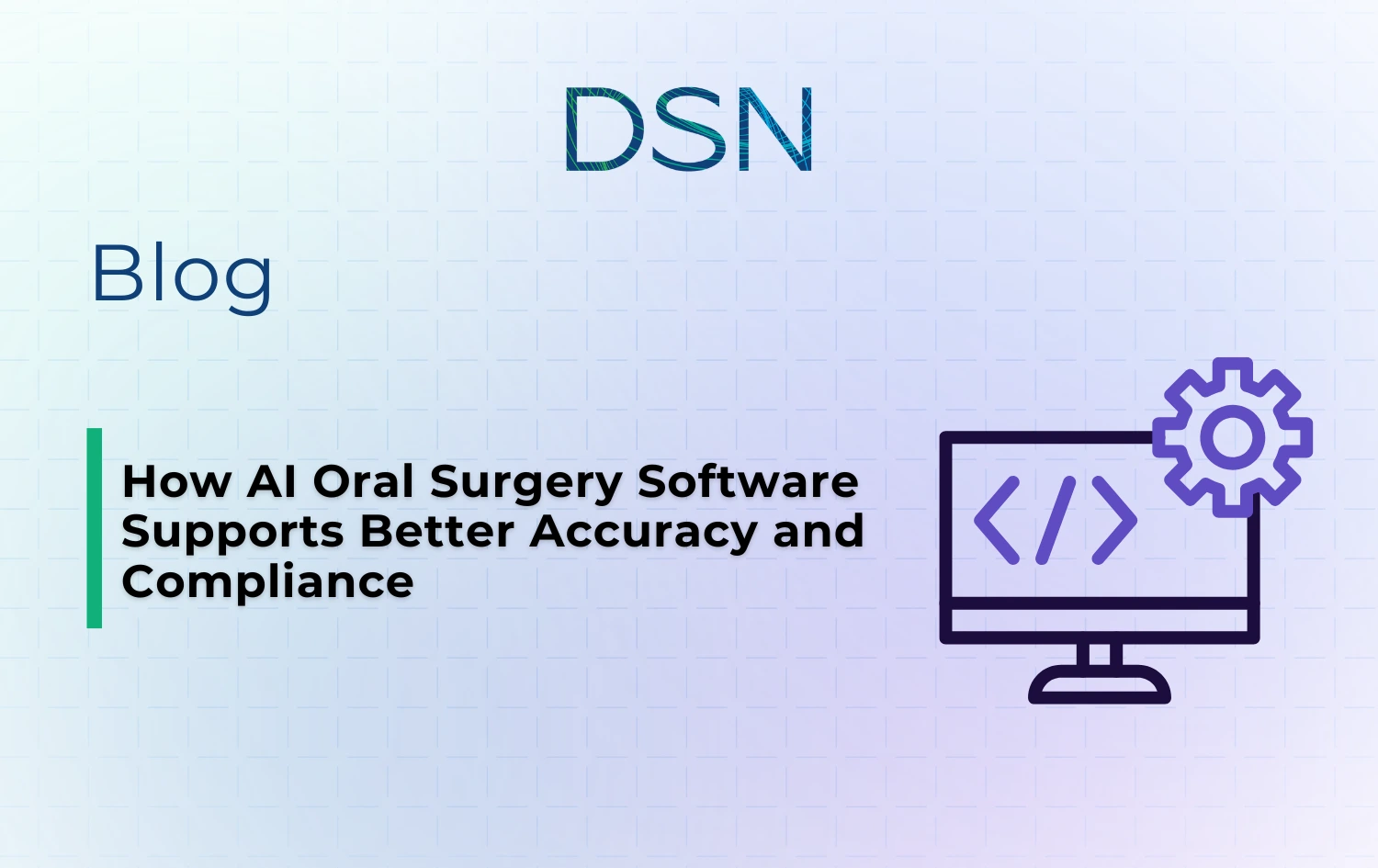AI oral surgery software is becoming one of the most talked-about tools in specialty practices today. For oral surgeons and practice administrators, the promise is clear: fewer errors, stronger compliance, and more confidence in documentation. But the real value comes from understanding how these systems actually work in day-to-day practice and how they support surgical teams beyond just the buzzword of “AI.”
What is AI Oral Surgery Software?
AI oral surgery software refers to practice management and clinical documentation systems that use artificial intelligence to assist surgeons and staff. Instead of replacing clinical judgment, the software helps automate repetitive tasks, spot inconsistencies, and streamline compliance requirements. For oral surgeons, this means faster notes, better accuracy in coding, and a clear audit trail that reduces the risk of missed details.
Why Accuracy Matters in Oral Surgery
Every oral surgery practice depends on accurate documentation. A missed clinical note or coding error can create ripple effects: denied insurance claims, longer reimbursement cycles, and potential compliance risks. Accuracy isn’t just about financial health, though. It directly impacts patient care, referrals, and even the reputation of a practice.
AI oral surgery software addresses this by:
- Suggesting complete, standardized notes
- Flagging missing data or inconsistencies in charts
- Supporting structured documentation that makes audits smoother
- Reducing human fatigue errors, especially in end-of-day charting
Compliance Challenges in Oral Surgery
Oral surgeons face unique compliance pressures compared to general dentistry. Because procedures often overlap with medical billing, practices must follow both dental and medical coding requirements. That means higher documentation standards and more complex insurance reviews.
Common compliance pain points include:
- Medical necessity documentation for extractions and implant procedures
- Cross-coding for procedures covered under medical insurance
- Maintaining HIPAA-compliant communication across teams and referrals
- Ensuring documentation supports surgical complexity levels
AI oral surgery software helps practices stay compliant by building those rules into the system. Instead of relying solely on staff memory or manual checks, compliance reminders are integrated into the workflow.
How AI Supports Better Surgical Notes
One of the most practical benefits of AI in oral surgery is automated note assistance. Surgeons often face end-of-day documentation fatigue, where hours of back-to-back surgeries are followed by an overwhelming stack of notes. AI systems can reduce this burden by:
- Auto-suggesting note templates based on procedure type
- Populating standard clinical details with one click
- Offering real-time prompts if important fields are left blank
- Structuring notes to support both clinical accuracy and billing needs
This doesn’t just speed things up. It ensures that the right information is consistently captured, protecting both the patient and the practice.
Financial Impact: Reducing Claim Denials
Insurance denials are one of the biggest hidden costs in oral surgery practices. Many denials stem from incomplete notes, inconsistent coding, or missing attachments. AI oral surgery software reduces these issues by aligning notes and codes as they are created. This alignment helps ensure that the submitted claim matches the documentation, cutting down on costly rework.
Where DSN Cloud Fits In
While AI features are still in beta across much of the industry, DSN Cloud is designed to support accuracy and compliance today. Practices using DSN Cloud benefit from:
- Centralized charting that keeps notes, images, and claims aligned
- Built-in coding support that reduces manual cross-referencing
- HIPAA-compliant storage and communication across surgical teams
- A modern, cloud-based platform that eliminates downtime tied to local servers
The AI enhancements being tested in DSN Cloud build on these strengths by offering real-time suggestions and compliance checks without slowing down the surgical team.
Real-World Feedback From Oral Surgery Practices
Surgeons and administrators often describe the relief of moving away from clunky, outdated systems. As one DSN Cloud user put it:
“DSN Cloud has made our workflow so much more efficient. We can focus on the surgery instead of worrying about whether our notes and claims will hold up.” 【source: DSN Reviews】
This kind of feedback highlights what matters most: accuracy, compliance, and time saved that can be reinvested into patient care.
What to Look For in AI Oral Surgery Software
If your practice is exploring AI-driven solutions, here are a few factors to consider:
- Accuracy-first design: Does the system prompt for missing details without overcomplicating workflows?
- Compliance support: Are coding updates and insurance rules built into the software?
- Cloud-based reliability: Can the team access secure records anytime, anywhere?
- User experience: Will surgeons and staff actually want to use it daily?
- Integration: Does it connect seamlessly with imaging, billing, and referral systems?
The Future of AI in Oral Surgery
The role of AI in oral surgery will only expand, but the best systems won’t try to replace the expertise of the surgeon. Instead, they will act as an assistant that reduces errors, strengthens compliance, and improves financial performance. That means more time for patients, fewer headaches with claims, and confidence in passing any audit.
Conclusion: A Smarter Way Forward
Accuracy and compliance are two of the biggest stress points for oral surgeons and practice administrators. AI oral surgery software can help reduce that stress by making documentation smarter, claims cleaner, and compliance less manual. With tools like DSN Cloud, practices can benefit today while preparing for the AI-driven features that are just around the corner.
If you want to see how DSN Cloud can support your oral surgery practice, you can schedule a demo anytime at dsn.com/book-a-demo.
